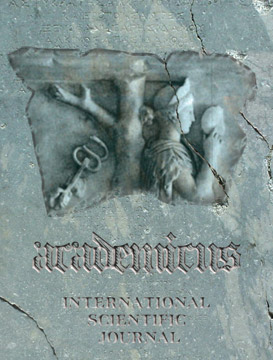Title:
Author(s):
Abstract:
It is often said today that the agreement on the possibility of greater mutual understanding among human beings has failed. Would have led to the resurgence of long-suppressed hatreds, hatreds that have their source in the differences linked to national identities, ethnic and religious. We would be short before the end of universalistic concepts that have permeated the last centuries. In addition, the skepticism resulting from the growing success of postmodern ideas on the philosophical and political. In fact, if we look at history, the decline of universalistic concepts is not specific to our age. The reassertion of national identities, ethnic and religious is a recurrent phenomenon, which occurs every time some supranational empire, more or less tyrannical, collapses. Neither seems safe to regard the resurgence of identity as a sign of abandonment of cosmopolitanism. Such events have happened in cyclic rhythm in the past and should not cause us to be pessimistic about a renewed success in the future of ideals that point to unite rather than divide, to enhance the factors that unite us as human beings rather than to emphasize the elements that separate us from each other. The loss of confidence in the sophistication, the current decline of universalist ideas are not phenomena whose origin can be traced to intellectual circles. They reflect, rather, the widespread perception that the future can not be better The problem, in short, is not to fight the global society, but to create a just global society. The term “globalization” in recent years has been loaded with negative meanings, has become a sort of fetish which gathers into one the world’s ills. All this is symptomatic of much confusion. You do not ever stress enough the positive aspects of globalization properly understood. Globalization means not necessarily homogenizing force. Globalize not necessarily equivalent to eliminate differences and identities. On the contrary. It may mean, however, give rise to a global society where respect for differences and identity becomes a matter of course. It is often said today that the agreement on the possibility of greater mutual understanding among human beings has failed. Would have led to the resurgence of long-suppressed hatreds, hatreds that have their source in the differences linked to national identities, ethnic and religious. We would be short before the end of universalistic concepts that have permeated the last centuries. In addition, the skepticism resulting from the growing success of postmodern ideas on the philosophical and political.
Keywords:
universalistic concepts; universalistic concepts; resurgence of identity; globalization; long-suppressed hatreds;
Full Text PDF:
References:
View complete reference list, click
here
Digital Object Identifier DOI:
The article's content ©Academicus™ National identity and global culture
by
Prof.Dr. Michele Marsonet
is licensed under a Creative Commons
Attribution-NonCommercial 4.0 International License.
Presented:
October 2009
Included for Publishing:
April 2010
Published:
April 2010,
Volume 1,
Issue 1
Academicus International Scientific Journal is an Open Access Journal. This means that all content is freely available without charge to the user or his/her institution. Users are allowed to read, download, print, search, or link to the full texts of the articles in this journal without asking prior permission from the publisher or the author. This is in accordance with the BOAI definition of open access. Users are obliged to cite the source (Academicus International Scientific Journal) and the author, according to the international citation standards.
To learn more about the OA Policy followed by Academicus ISJ, read Journal Regulations
Academicus
International Scientific Journal
pISSN 2079-3715
eISSN 2309-1088
Address:
Sheshi i Flamurit, Rruga Muze
Al-9401 Vlorë, Albania
Tel: +355 68 60 60 555
info@academicus.edu.al
https://academicus.edu.al



 Scholar
Scholar
 Crossref
Crossref
